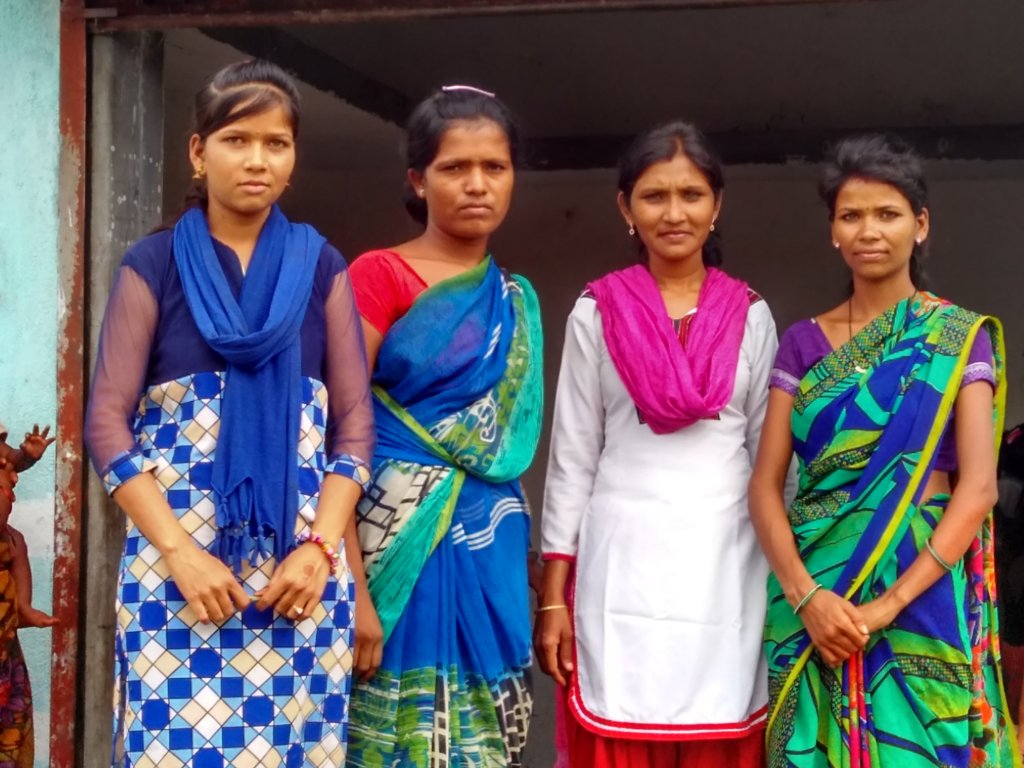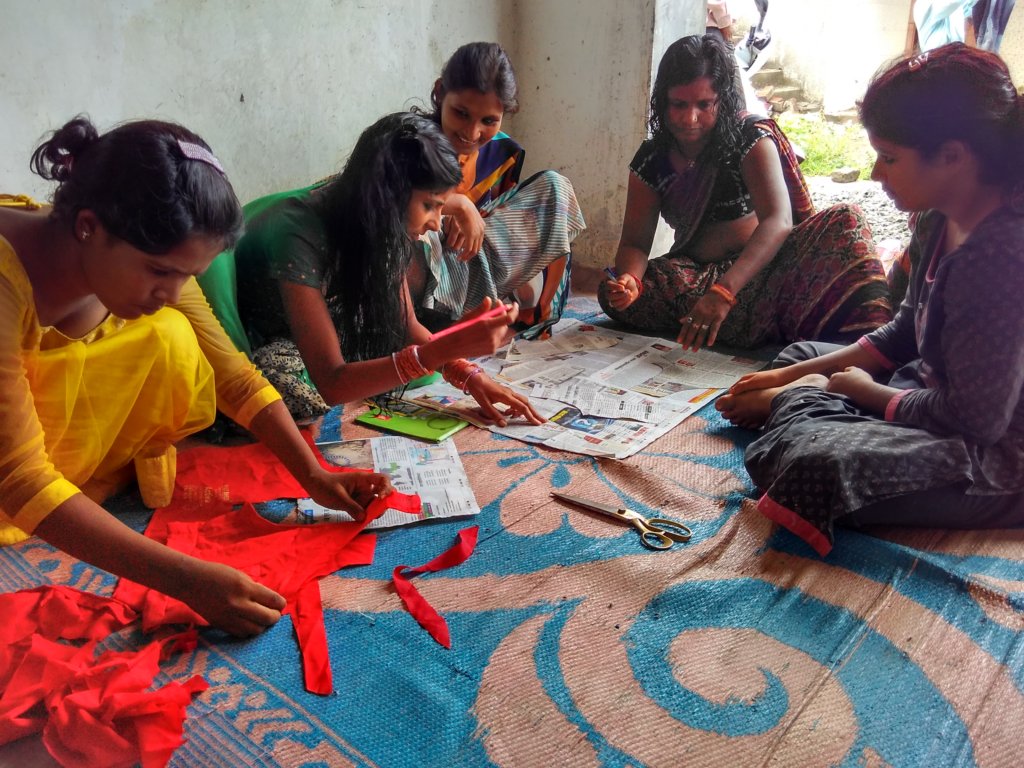Project Report
| Sep 5, 2017
Ayesha has started to earn
By Amoghamati Traud-Dubois | Programme manager
![Ayesha and other women from the Pardhi community]()
Ayesha and other women from the Pardhi community
Ayesha (not her real name) has started to earn a living by selling blouses and other cloths she has produced.
Ayesha is from a Pardhi tribal community living at the outskirts of Amravati. Pardhis suffer from sever discrimination for ages. Having the reputation of being criminal by birth it's extremely difficult for them to integrate in mainstream society. For Ayesha and her friends it has been a unique experience that the project team invited them into their house. They are normally never invited by non-Pardhi people.
This has built confidence and a feeling of acceptance in the group of Pardhi women. Especially Ayesha has changed a lot in the one year of participating in the training. Her family income comes from producing alcohol and from begging. More and more Ayesha expressed that she doesn't want to continue with this. She is eager to earn a living which is not humiliating and harming. Being a clever young woman she learnt sewing cloths very quickly. Now Ayesha has started to take orders of sewing which increases her income. She has even initiated to start the same training in her community. She has learnt so swiftly that she can now even pass her knowledge on. With the help of the project she builds herself up as a teacher for other women. Now there is one sewing class in her community location supported by the project.
Ayesha is better educated than most of her community. She has finished 12 years of schooling which is unusual. This helps her to set up a small business on her own and also to teach other women. She is very keen to expand more and more so that her family no longer needs to pursue humiliating ways of income generation.
She is a role model for other women and encourages them to participate in the course. And of course she is also encouraging education for girls in the community.
![Sewing class in the community]()
Sewing class in the community
![Share on Twitter]()
![Share on Facebook]()
Jun 2, 2017
Arti gains skills and courage
By Amoghamati Traud-Dubois | Programme manager
![Arti and her son]()
Arti and her son
Arti is a 23 year young women. She got married at the age of 16 which obviously was a case of child marriage. Arti had never seen her husband until she married him. Her parents decided about her marriage and she didn't dare to oppose. So she gave in to marry. Her husband is a farmer. Sadly he behaved very rudely with Arti. They never had a good time with each other but they were always quarrelling. During this time Arti gave birth to two sons: Ayush and Swaraj. Ayush is 5 years old and a very quite boy. Swaraj is a 2 years old toddler. 4 month ago she left her husband and lives with her parents now. He is such a violent man and even tried to burn her by soaking her with kerosene. Fortunately she could save herself and flee to her parents.
Who weren't happy to take her back as they are poor and live in a very cramped slum place. For her parents it had seemed normal to marry her off very young. Like very many girls in India she has been made to married without her consent and choice. There was no opportunity to express her feelings and thoughts at her home. She has never been part of the family discussion. After she got married it was similar. Never did she have any right of choice or expression. She was fully dependend on her husband. Whenever she needed something she had to ask her husband. Also did he abuse her shortly after their marriage. Already she was a victim of child marriage and then she faced all this domestic violence. It was a really difficult time for Arti.
When the team spoke to Arti’s mother she slowly understood that it was a mistake to marry her daughter so young. As the project is raising awareness against child marriage she understands now how fatal it is. But they felt helpless. As parents of a girl they always felt pressure about her marriage. What will happen if she falls in love? Or choose a partner on her own? As Arti's mother puts it: "what will happen if she goes on any wrong path?" To prevent something like this to happen they decided to marry her as teenager. A very common thing to happen in India until today.
Due to the project Arti got the opportunity to learn sewing and stitching. Here she learns vocational skills and also attends awareness programs on women's health, gender, and violence against women. Here she felt welcome and understood.The new situation is helping Arti to think clearly about her future. Now she has many hopes for her life which she couldn't think of before. She doesn't want to follow her mother's example who works as a domestic worker. This work is very low paid and humilating.
Now Arti is near to completing her tailoring course and she is optimistic about her life. Along with the technical training she participated in personality development activities offered by the project. With the training she started to practice at home. Now she feels more positive and much less depressed than before. She shares her thoughts and issues. She has not yet decided whether she will stay alone or continue the relationship with her husband. In any case she is confident that this time she will take her own proper decision and for that she is preparing herself. She is confident that even if she goes back to her husband she wouldn’t be depend on him like she was before. Definitely she won’t allow him to be violent against her again.
![Share on Twitter]()
![Share on Facebook]()
Mar 6, 2017
A new perspective for tribal slum women
By Amoghamati Traud-Dubois | Programme Manger
![Young tribal women coming for livelihood training]()
Young tribal women coming for livelihood training
Among the most marginalised people in India are tribal communities. They live in spots separate from other slum dwellers. It hasn't been easy for the Bahujan Hitay project team to include women from the tribal Pardhi community. During the first weeks of building rapport with the community the team was hardly welcome at all. With patience and perseverance they have now reached out to a group of women who participate in a sewing class. The social situation of these women is pathetic even in the Indian context. Being marginalised and discriminated against for centuries women of this community face extreme oppression also by their male family members. It’s the task of women and children to beg in trains and at cross roads in the cities. Women always need to have a baby with them to appeal to people for donations which increases the birth rate. The habit of begging means of course that children miss out on school a lot. Hardly any Pardhi woman has finished school, most drop out after a few years. The women are denied all own decision making, the families decide when and whom they have to marry. Child marriages are common and most women deliver first as teenagers. They also have no choice for their health or pregnancies. The custom requires that they deliver on their own without skilled birth attendance let alone hospital. Thereafter they are considered impure for 7 days during which they are secluded on their own with their new born. By this the death rate for both mothers and babies is much higher than the Indian average.
This is the background on which a group of 10 Pardhi women has over the course of months managed to be allowed the attendance of a sewing class. The BH Amravati team has decided to not run the class in the hamlet as they normally do but to bring the women into their training centre. It means an exposure to a completely new world for these women who are never allowed into other communities’ houses and who live in filthy unhygienic huts surrounded by rubbish. Abhayanavita, the project leader says: "After a couple of visits the women became cleaner and more carefully dressed. They enjoy the training and the exchange with the team which also includes counselling." Now the team can visit the hamlet and will be invited to stay instead of straight being chased away.
It will need much more patience to help the women change their lives for the better. It’s the first step to work with this difficult to access community which has been neglected and overlooked for long.
![Tribal girl discussing]()
Tribal girl discussing
![Share on Twitter]()
![Share on Facebook]()

